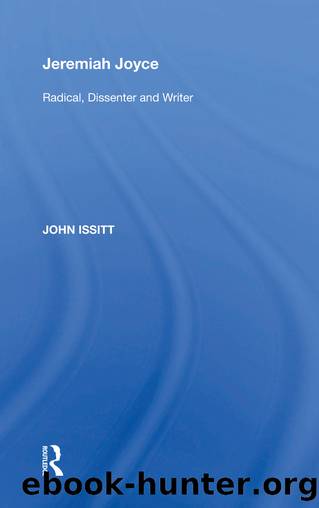Jeremiah Joyce by John Issitt

Author:John Issitt [Issitt, John]
Language: eng
Format: epub
Tags: History, General
ISBN: 9781351155069
Google: z_dADwAAQBAJ
Publisher: Routledge
Published: 2017-11-30T01:31:52+00:00
Editing the Imperial Review
The short-lived Imperial Review or London and Dublin Literary Journal was published by Cadell and Davies in London and a number of Irish publishers in Dublin, Cork and Belfast from January 1804 to December 1805.33 It was printed by Luke Hansard, the printer of government proceedings, but the editors, throughout all 23 issues signed themselves simply 'the editors'. Confirmation that Joyce was one of these editors comes from two sources: first, a letter from Cadell and Davies to the 'Conductors of the Imperial Review' which was addressed to Joyce's friend and fellow Unitarian William Shepherd in which Joyce is named as one of the editors, and to which Joyce replies; and second, in a letter from the Quaker William Rathbone to Joyce regarding a review of Rathbone's Narrative of Events in Ireland among the Quakers (1786) which appears in the Imperial Review.34
The prospectus in the Imperial Review's first issue of January 1804 outlines the motive for publication:
The Metropolis of Ireland, a part of the United Kingdom, which has given birth to a fair proportion of literary eminence, is still in want of its "review". The present undertaking, it is hoped, will supply that want, as well as tend to strengthen the literary connection between the Sister Islands.
Part of the connection with Ireland was the proximity of William Shepherd in the port of Liverpool, which was the main conduit of trade and passage between England and Ireland. However, in substance the Review's claimed motivation to strengthen literary connections wasn't realised since it failed to carry extensive Irish or Irish-related contributions. The main contents were reviews of classical authors, weighty scientific treatises and the works of prominent dissenters placed in subsections on Antiquities, Biography, Chemistry, Medicine and Surgery, Classical Literature and Theology. The works of William Godwin, Thomas Malthus, Joseph Priestley and many more were given lengthy reviews by anonymous reviewers probably including Joyce. The introduction to the first issue claims justification for the 'art of criticism' from 'maxims of antiquity' and also claims that 'the rules of criticism' were deduced 'from the study of Homer and other Greek writers' and serve as 'principles which have been universally received by the enlightened part of the world as the standard of true taste'.
In their letter to the 'Conductors of the Imperial Review' the Publishers Cadell and Davies suggest that they felt themselves in an awkward position as a result of the anonymity of the editors. Spurred by 'many objections to the reviews' and 'the concerns of a very respectable clergyman', they claimed that the review of John Mason Good's Life of Dr Geddes, was unfair and mischievous.35 They urged the editors to make a statement of their general position. Joyce's draft response was to have been published in the Review but failed to appear. Here Joyce gave ground to the particular objection concerning the anonymous review of the Life of Dr Geddes, conceding that it was 'insufficiently qualified'. He gave less ground on the general point of the political position
Download
This site does not store any files on its server. We only index and link to content provided by other sites. Please contact the content providers to delete copyright contents if any and email us, we'll remove relevant links or contents immediately.
Machine Learning at Scale with H2O by Gregory Keys | David Whiting(4282)
Never by Ken Follett(3919)
Harry Potter and the Goblet Of Fire by J.K. Rowling(3834)
Unfinished: A Memoir by Priyanka Chopra Jonas(3361)
Fairy Tale by Stephen King(3354)
The Man Who Died Twice by Richard Osman(3055)
Will by Will Smith(2891)
Rationality by Steven Pinker(2340)
It Starts With Us (It Ends with Us #2) by Colleen Hoover(2317)
Can't Hurt Me: Master Your Mind and Defy the Odds - Clean Edition by David Goggins(2309)
The Dark Hours by Michael Connelly(2289)
The Storyteller by Dave Grohl(2212)
Friends, Lovers, and the Big Terrible Thing by Matthew Perry(2208)
The Becoming by Nora Roberts(2178)
The Dawn of Everything: A New History of Humanity by David Graeber & David Wengrow(2177)
The Stranger in the Lifeboat by Mitch Albom(2104)
Cloud Cuckoo Land by Anthony Doerr(2080)
Love on the Brain by Ali Hazelwood(2046)
Einstein: His Life and Universe by Walter Isaacson(1997)
